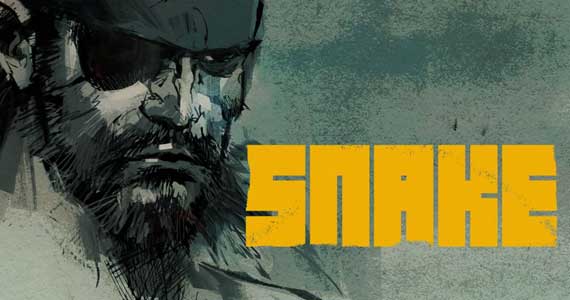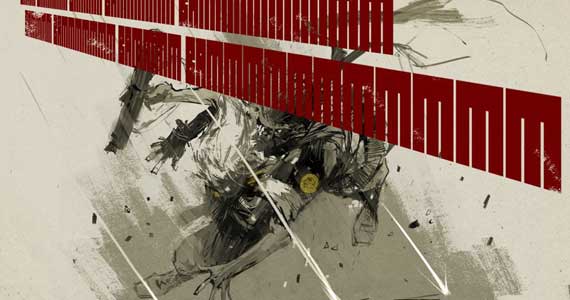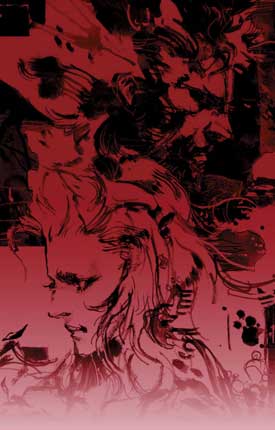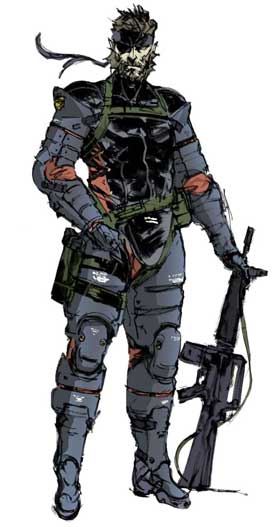
I recently took a run through the English demo for Metal Gear Solid Peace Walker – English being the key draw since I’ve already run through the demo released during the Tokyo Game Show a few times. For all the talk of control schemes, the demo offers two – shooter type and action type – which switch camera controls between the directional and face buttons of the PSP to allow for left or right handed controls.
I went with shooter type, not because it necessarily fit my grip better, but because switching the hand responsible for the camera really isn’t that big a deal to me. Negotiating 3D space in any game is a bitch with no ideal solution on the horizon, especially on a handheld and with a game that involves stealth and taking in as much of your surroundings as possible. MGS is a tricky beast to design controls for, but a certain amount of patience makes it workable – though I’m not sure how quick I’ll ever be at it.
Having already played through the obstacle course, and eluded men wearing bright jackets in the jungle, my return visit was entirely about the English translation of the cinematic sequences.

Naked Snake and his army for hire, Militaires Sans Frontières – Soldiers without Borders are asked to intervene in Costa Rica to oust an unknown military force. And while the end game of a Metal Gear title stands to spiral off into plenty of directions as the plot unravels, Kojima’s interest in the word “peace” and playing with concept of “sold[iers]” is ever present from the beginning.
The comic art style of the portable series creates a compellingly distinct series of cinematics, offering the player control over the viewpoint, which allows for visually trickery and is aided by splashes of color that make Kojima’s infamous love of filmic sequences more engaging. I’m reminded of a feeling that the graphic-novel-touches within the original Metal Gear Solid were lost too soon for a more visually realistic series of codec conversations.
And aside from these elements, Peace Walker returns us to a time period that represents Metal Gear Solid at its best, putting us in the heavy boots of the man who would become Big Boss.

Snake Eater can never be credited enough for legitimizing the series in a broader sense, making Metal Gear more than the sum of its stealth action parts in additionally establishing the series as one of the greatest narratives in the short history of videogames. That’s not to say that the contemporary and future leaning entries in the series are lacking, rather that without the context these time warps in the series take, the franchise would be left as flat as any other action series forcing its viewpoint of the world on gamers from a vacuum.
Admittedly I’m smitten with the lower tech settings of the time period, but the larger share of my enthusiasm is for the way in which these entries insert the series into our shared history, chaining the game to events we are (hopefully) well aware of prior to playing to produce an experience more significant for the trouble. More importantly, the time hop bonds the game to a period when ideologies battled for the right to shape the world we live in today, gifting the series with a powerful backbone to support the future forward expeditions still to come.
The context also makes it easier to intake the characters of the series, their bizarre personalities and abilities rooted in the ripples of our own history. Hearing that characters participated in historical events strengthens perceptions of things the player never sees, and I feel an abstract desire to compare it to the monster we never see beyond its acts.

In line with the abstract, Snake Eater raised the concept of absorbing that power into ourselves, consuming the mythical status of those we defeat. The series’ exploits on the PSP are entirely focused on the weight of having consumed The Boss’ power and how the world will be shaped by Naked Snake’s decisions for expending it. It all falls on Big Boss, a character who nearly seems capable of passing into our world, his image on flags and posters draped across the buildings of third world countries.
All of these ramblings only matter because of the potential comparison to how other games perceive time, trying to convey a sense of events connected and unfolding simultaneously and creating titles with a disconnected series of A.D.D driven sequencing.
Metal Gear Solid still focuses on the white hot minute, a bubble of time that will have far reaching consequences, rooted in an experience that seeks to provide a context for understanding the situation in its entirety.
I’m not going to strike the iron hot here on this attempt, but there’s a greater history lesson at work within the series, with the potential to illustrate how fractured our perceptions of events have become and how that has infected our contemporary narrative pursuits.
Now seems like a good time to mention that you can still grab the demo via the PlayStation Store, if you haven’t already.
I have to be honest: Snake Eater has been the only game since 1984 that I haven’t finished completely. After the fight with The Sorrow I didn’t feel like going on. I might finish it eventually but that was a year ago and it’s still on it’s case on the shelve…
Comment by EdEN — January 7, 2010 @ 12:58 pm
While I personally, and obviously, love the game quite a bit, I get where you’re coming from. Snake Eater can be a really exhausting experience at times. Metal Gear games are also incredibly awkward to take a break from and return to without restarting.
Comment by Jamie Love — January 7, 2010 @ 1:19 pm
Aw man! I don’t want to spoil anything, but you were so close to the end man, and the end of that game is such a huge part of the MGS3 experience.
I really dig how all the Metal Gear games offer such a great-yet-different experience from each other, but I think MGS3 was the best overall package of them all. I think I’m on my fourth or fifth play through of it, which has to be one of my highest.
Comment by Michael Tucker — January 8, 2010 @ 9:47 pm
Mmm, now you got me thinking Michael. I might give Snake Eater a go at the end of the month. But as Jamie has said, leaving a Metal Gear game and returning to it is awkward as hell. Guess I’ll have to read guide on Gamefaqs to remember what I have done up until the quit-point.
Comment by EdEN — January 13, 2010 @ 4:44 pm